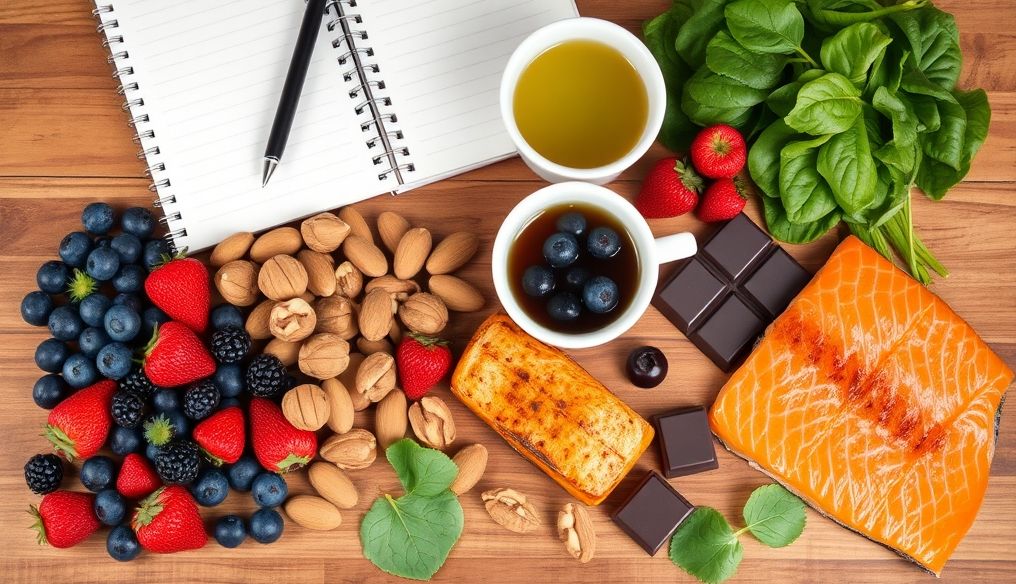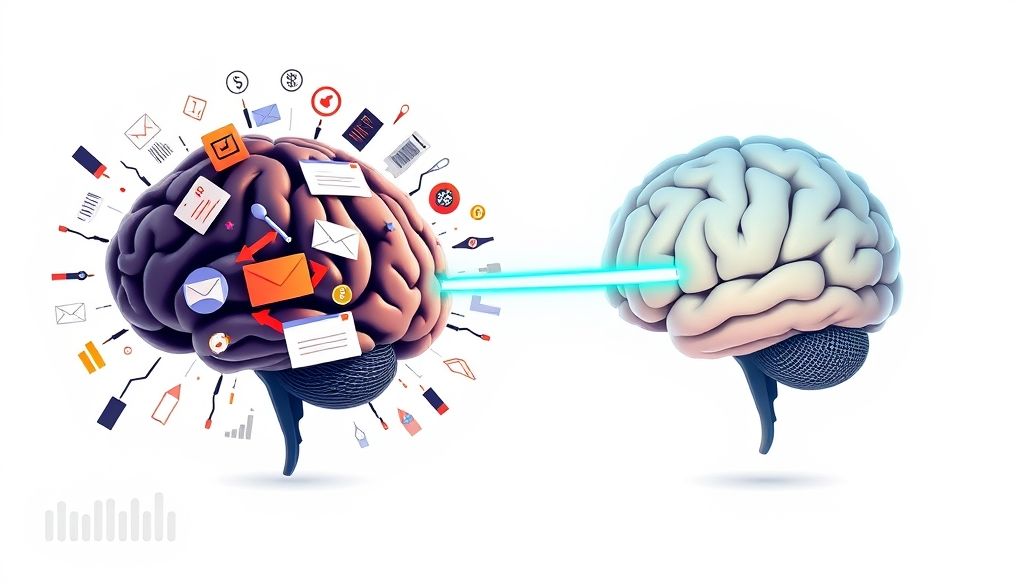What Foods Boost Focus and Cognitive Function?
In today's fast-paced world, where the demands for focus and productivity are increasing, many are looking for natural ways to enhance their cognitive functions. Nutrition plays a crucial role in brain health and performance, as certain foods contain nutrients that support focus, memory, and learning abilities. This article will highlight these foods and how to incorporate them into your daily diet.
Chapter 1: Basics of Nutrition for the Brain
The Importance of Proper Nutrition for the Brain
The brain, being the most complex organ in the body, consumes a significant amount of energy and nutrients. Proper nutrition ensures that the brain receives the fuel it needs to perform its functions optimally. A deficiency in certain nutrients can lead to poor concentration, memory problems, and even depression.
Key Nutrients for Brain Health
- Omega-3 Fatty Acids: Essential for building neuronal cell membranes and improving communication between them.
- Antioxidants: Protect the brain from damage caused by free radicals.
- B Vitamins: Play a role in the production of neurotransmitters and improve memory functions.
- Choline: Necessary for the production of acetylcholine, a neurotransmitter important for memory and learning.
- Minerals (Iron, Zinc, Magnesium): Play a role in various brain functions, including focus and memory.
Chapter 2: Superfoods to Boost Focus
Fatty Fish (Salmon, Sardines, Mackerel)
Fatty fish are rich in omega-3 fatty acids, especially docosahexaenoic acid (DHA) and eicosapentaenoic acid (EPA), which are essential for brain health. Studies have shown that regular consumption of fatty fish can improve memory, concentration, and reduce the risk of cognitive decline.
Tip: Aim to consume two servings of fatty fish per week.
Berries (Blueberries, Strawberries, Blackberries)
Berries are packed with antioxidants, especially anthocyanins, which protect the brain from damage caused by free radicals. In addition, berries can improve blood flow to the brain, enhancing its cognitive functions.
Tip: Add berries to your breakfast or enjoy them as a healthy snack.
Nuts and Seeds (Walnuts, Almonds, Pumpkin Seeds)
Nuts and seeds provide a variety of nutrients beneficial for the brain, including vitamin E, magnesium, zinc, and healthy fatty acids. Walnuts, in particular, resemble the brain in shape and contain a high percentage of omega-3 fatty acids.
Tip: Eat a small handful of nuts and seeds as a snack between meals.
Eggs
Eggs are an excellent source of choline, a nutrient necessary for the production of acetylcholine, a neurotransmitter important for memory and learning. Eggs are also rich in protein, which helps regulate blood sugar levels and provide sustained energy for the brain.
Tip: Start your day with a breakfast that includes eggs.
Green Leafy Vegetables (Spinach, Kale, Lettuce)
Green leafy vegetables are rich in vitamins, minerals, and antioxidants that support brain health. Vitamin K, in particular, plays a role in improving memory functions.
Tip: Add green leafy vegetables to salads, smoothies, or side dishes.
Green Tea
Green tea contains caffeine, which can improve focus and alertness, as well as antioxidants such as catechins, which protect the brain from damage. Green tea also contains the amino acid L-theanine, which promotes relaxation and reduces stress, improving concentration.
Tip: Replace coffee with green tea for a more sustained energy boost.
Coffee (in moderation)
The caffeine in coffee can improve focus and alertness by blocking the effect of adenosine, a neurotransmitter that causes drowsiness. However, coffee should be consumed in moderation, as excessive caffeine intake can lead to anxiety and insomnia.
Tip: Enjoy a cup or two of coffee in the morning to improve focus.
Dark Chocolate
Dark chocolate contains antioxidants and flavonoids, which improve blood flow to the brain and enhance its cognitive functions. Dark chocolate also contains caffeine and theobromine, both natural stimulants that can improve focus and mood.
Tip: Choose dark chocolate with a high percentage of cocoa (70% or more).
Turmeric
Turmeric contains curcumin, a compound with anti-inflammatory and antioxidant properties. Studies have shown that curcumin can improve memory and mood and protect the brain from cognitive decline.
Tip: Add turmeric to Indian or Asian dishes or take it as a dietary supplement.
Chapter 3: Recipes to Enhance Focus
Refreshing Berry Smoothie
- 1 cup of mixed berries (blueberries, strawberries, blackberries)
- 1/2 cup of spinach
- 1/2 cup of water or almond milk
- 1 tablespoon of chia seeds
Blend all ingredients in a blender until smooth. Enjoy this smoothie as a breakfast or healthy snack.
Salmon and Avocado Salad
- 1 slice of grilled salmon
- 1/2 avocado
- 1 cup of mixed greens
- 1/4 cup of chopped walnuts
- Simple dressing of olive oil and lemon
Mix all ingredients in a large bowl. Enjoy this salad as a healthy lunch or dinner.
Scrambled Eggs with Spinach and Tomatoes
- 2 eggs
- 1/2 cup of chopped spinach
- 1/4 cup of chopped tomatoes
- Salt and pepper to taste
Whisk the eggs with salt and pepper. Heat a pan over medium heat and add the spinach and tomatoes. Cook for one minute, then add the eggs. Cook until the eggs are set. Enjoy this dish as a nutritious breakfast.
Chapter 4: Dietary Habits to Enhance Cognitive Functions
Eat Regular Meals
Avoid skipping meals, as this can lead to low blood sugar levels and poor concentration. Eat regular and balanced meals to maintain stable energy levels.
Stay Hydrated
Dehydration can negatively affect brain functions. Drink enough water throughout the day to stay hydrated and promote focus.
Limit Sugar and Processed Foods
Sugar and processed foods can lead to fluctuations in blood sugar levels and poor concentration. Reduce your intake of these foods and focus on whole, natural foods.
Exercise Regularly
Exercise improves blood flow to the brain and enhances its cognitive functions. Exercise regularly, even if it's just walking for 30 minutes a day.
Get Enough Sleep
Adequate sleep is essential for brain health and performance. Aim to get 7-8 hours of sleep each night.
Chapter 5: Dietary Supplements to Support the Brain
In addition to the foods mentioned above, certain dietary supplements can support brain health and improve cognitive functions. Consult your doctor before taking any dietary supplements.
- Fish Oil: Provides omega-3 fatty acids essential for brain health.
- B Vitamins: Support the production of neurotransmitters and improve memory functions.
- Ginkgo Biloba: Improves blood flow to the brain and enhances its cognitive functions.
- Curcumin: Has anti-inflammatory and antioxidant properties and protects the brain from cognitive decline.
Chapter 6: Foods to Avoid to Enhance Focus
Some foods can harm brain health and impair focus. It's important to avoid these foods or limit their intake as much as possible.
- Processed Foods: Contain high levels of sugar, unhealthy fats, and additives that can negatively affect brain functions.
- Sugary Drinks: Cause fluctuations in blood sugar levels and poor concentration.
- Alcohol: Can damage brain cells and impair cognitive functions.
- Fried Foods: Contain high levels of unhealthy fats that can harm brain health.
Chapter 7: Studies and Research on Foods and Brain Functions
Many studies and research have shown the relationship between proper nutrition and brain functions. For example, a study published in the journal "Alzheimer's & Dementia" found that following a diet rich in fish, vegetables, fruits, and nuts is associated with a reduced risk of developing Alzheimer's disease.
Another study published in the journal "Journal of Alzheimer's Disease" found that regular consumption of berries can improve memory and cognitive functions in older adults.
Chapter 8: Practical Tips for Incorporating Focus-Boosting Foods into Your Diet
- Plan Your Meals in Advance: Set aside time to plan your meals and make sure to include focus-boosting foods in each meal.
- Keep Healthy Snacks on Hand: Instead of reaching for unhealthy snacks, keep nuts, seeds, fruits, and vegetables on hand to eat between meals.
- Try New Recipes: Look for new and exciting recipes that include focus-boosting foods.
- Make it a Habit: Make eating focus-boosting foods a part of your daily routine.
Chapter 9: Conclusion
Nutrition plays a crucial role in brain health and performance. By eating foods that boost focus and cognitive functions, you can improve your memory, learning abilities, and increase your productivity. Make proper nutrition a priority and enjoy the benefits of a healthy and active brain.
Disclaimer: This article is for informational purposes only and should not be considered a substitute for professional medical advice. Consult your doctor or a nutritionist before making any changes to your diet.




